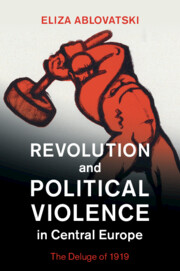Book contents
- Revolution and Political Violence in Central Europe
- Studies in the Social and Cultural History of Modern Warfare
- Revolution and Political Violence in Central Europe
- Copyright page
- Dedication
- Contents
- Tables
- Figures
- Acknowledgments
- Introduction
- 1 Central European Roots of Revolution
- 2 World War and World Revolution
- 3 Rumor and Terror
- 4 Revolution on Trial
- 5 Seeing Red
- 6 Remembering the World Revolution
- Conclusion
- Bibliography
- Index
4 - Revolution on Trial
Published online by Cambridge University Press: 18 June 2021
- Revolution and Political Violence in Central Europe
- Studies in the Social and Cultural History of Modern Warfare
- Revolution and Political Violence in Central Europe
- Copyright page
- Dedication
- Contents
- Tables
- Figures
- Acknowledgments
- Introduction
- 1 Central European Roots of Revolution
- 2 World War and World Revolution
- 3 Rumor and Terror
- 4 Revolution on Trial
- 5 Seeing Red
- 6 Remembering the World Revolution
- Conclusion
- Bibliography
- Index
Summary
This chapter examines how the police and courts became the main audience for competing revolutionary narratives of guilt and victimization. People wanted to punish others and rehabilitate themselves. The courts functioned both as a sounding board for narratives through which one found resonance and affected verdicts and sentencing and also as a transmitter of new narratives to the public, as court verdicts seemed to be the official or “true” story of the revolutions. The transnational comparison of Budapest and Munich shows that the narrative developed in each was quite different and led to differential severity of verdicts and sentencing, with the courts in Hungary being more punitive. This situation in turn further radicalized Hungarians on the Left and the Right in the interwar period, with the “judicial terror” added to the fraught narrative of revolution and counterrevolution. In Bavaria, though memoirs such as Ernst Toller’s sought to rally supporters with examples of legal mistreatment, the revolution did not play as central a role in the symbolic world of Weimar German politics, overshadowed by even limited events such as the January 1919 Spartacus Uprising and the martyrdom during that revolt of the communist leaders Karl Liebknecht and Rosa Luxemburg.
- Type
- Chapter
- Information
- Revolution and Political Violence in Central EuropeThe Deluge of 1919, pp. 120 - 165Publisher: Cambridge University PressPrint publication year: 2021



